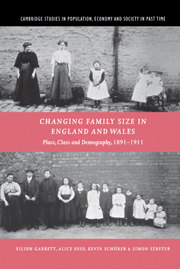Book contents
- Frontmatter
- Contents
- List of figures
- List of tables
- Preface and acknowledgements
- 1 Introduction
- 2 Locations for study
- 3 Studying locations
- 4 Infant and child mortality from the 1911 census
- 5 Fertility and fertility behaviour 1891–1911
- 6 The national picture
- 7 Class, place and demography: the mosaic of demographic change in England and Wales from Waterloo to the Great War
- Appendices
- References
- Index
- Cambridge Studies in Population, Economy and Society in Past Time
6 - The national picture
Published online by Cambridge University Press: 05 January 2010
- Frontmatter
- Contents
- List of figures
- List of tables
- Preface and acknowledgements
- 1 Introduction
- 2 Locations for study
- 3 Studying locations
- 4 Infant and child mortality from the 1911 census
- 5 Fertility and fertility behaviour 1891–1911
- 6 The national picture
- 7 Class, place and demography: the mosaic of demographic change in England and Wales from Waterloo to the Great War
- Appendices
- References
- Index
- Cambridge Studies in Population, Economy and Society in Past Time
Summary
Introduction
In the preceding chapters it has been argued that ‘environment’, the physical and social surroundings in which an individual lived, was very important to the experience of child bearing and rearing in the late Victorian and Edwardian era. Living in insalubrious physical surroundings was, it has been demonstrated, more lethal to young children than being born into poor circumstances, although sight cannot be lost of the fact that the chances of experiencing these two conditions were often very closely related. Nevertheless poverty-stricken couples living in the countryside could rear broods of relatively healthy children, while even the well-off incurred a ‘penalty’ with respect to child survival if they chose to rear their families in centres of industry. Social environment, the composition of one's neighbours in the community, on the other hand, appears to have played a major role in determining a couple's childbearing strategies, in conjunction with their expectations and behaviour in relation to courtship and marriage. The conclusion had also been reached that social class differences in fertility and the life chances of children were somewhat exaggerated by the differential distribution of occupations and therefore social classes across the spectrum of environments.
These conclusions were, however, reached solely on the basis of the OPCS dataset, a very small and possibly unrepresentative fraction of the population of England and Wales.
- Type
- Chapter
- Information
- Changing Family Size in England and WalesPlace, Class and Demography, 1891–1911, pp. 337 - 406Publisher: Cambridge University PressPrint publication year: 2001

